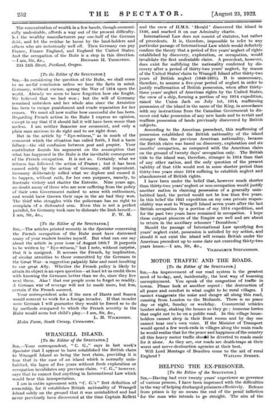WRANGELL ISLAND.
[To the Editor of the SPEcrierou.] SIR,—Your correspondent, "C. G.," says in last week's Spectator that I appear to have established the British claim to Wrangell Island as being the best claim, providing it is true that in the case of an island which is normally unin- habited, the lapse of five years without fresh exploration or occupation invalidates any previous claim. "C. G.," however, says that he cannot find anything in International Law which would bear this interpretation.
I am in entire agreement with "C. G.'s " first definition of ownership, for it establishes British nationality of Wrangell Island solely on the ground that it was uninhabited and had never previously been discovered at the time Captain Kellett and the crew of H.M.S. ' Herald ' discovered the island in 1849, and marked it on our Admiralty charts.
International Law does not consist of statutes, but rather of precedents. It is, therefore, impossible to refer to any particular passage of International Law which would definitely confirm the theory that a period of five years' neglect of rights established by discovery, exploration, or occupation, would invalidate the first undeniable claim. A precedent, however, does exist for nullifying the nationality conferred by dis- covery after a period of thirty-two years' neglect, by reason of the United States' claim to Wrangell Island after thirty-two years of British neglect (1849-1881). It is unnecessary, therefore, to assume a five-year period of neglect in order to justify reaffirmation of British possession, when after thirty- three years' neglect of American rights by the United States, the crew of a ship, forming a portion of my 1914 expedition, raised the Union Jack on July 1st, 1914, reaffirming possession of the island in the name of the King, in accordance with my instructions from the Canadian Government to dis- cover and take possession of any new lands and to revisit and reaffirm possession of lands previously discovered by British subjects.
According to the American precedent, this reaffirming of possession established the British nationality of the island stronger than the previous American nationality, because the British claim was based on discovery, exploration and six months' occupation, as compared with the American claim on the ground of twenty days' occupation only. The British title to the island was, therefore, stronger in 1914 than that of any other nation, and the only question of the present validity of that title would rest in some shorter period than thirty-two years since 1914 sufficing to establish neglect and abandonment of British rights.
I have been under the belief that, however much shorter than thirty-two years' neglect or non-occupation would justify another nation in claiming possession of a generally unin- habited land, the period would not be less than five years. In this belief the 1921 expedition on my own private respon- sibility was sent to Wrangell Island seven years after the last British occupation by a portion of my 1914 expedition, and for the past two years have remained in occupation. I hope these outpost pioneers of the Empire are well and are about to return in the auxiliary schooner 'Donaldson.'
Should the passage of International Law specifying five years' neglect exist, possession is satisfied by my action, and should it not exist the island will remain British under the American precedent up to some date not exceeding thirty-two years hence.—I am, Sir, &e.,
VILHJALMUIL STEFANSSON.


































 Previous page
Previous page